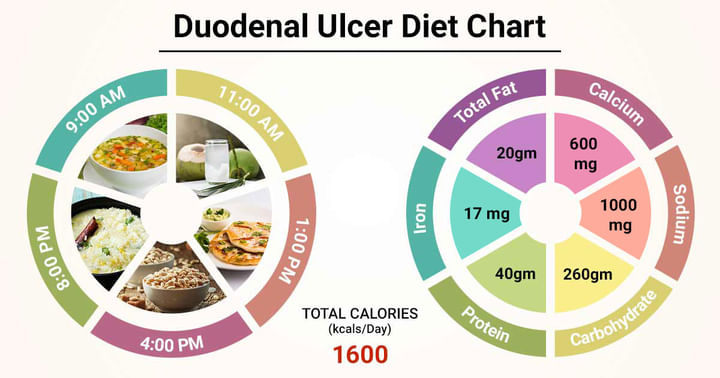Get the App
For Doctors
Login/Sign-up
About
Health Feed
Find Doctors
Diet Chart For duodenal ulcer
Last Updated: Jan 20, 2025
About
Duodenal ulcers are often called peptic ulcers. A peptic ulcer is an ulcer caused by stomach acid. An ulcer occurs where the lining of the gut is damaged and the underlying tissue is exposed. If you could see inside your gut, an ulcer looks like a small, red crater on the inside lining of the gut. It occurs in the upper part of the intestine and just after the stomach, called the duodenum. It is often seen in overweight people, hence one of the ways of preventing duodenal ulcer is reducing weight.
Foods that are recommended along with medication are:
Fruits: Provides the body with simple sugars
Vegetables and Whole grains: Contains fibre
Herbal tea: Relaxes the muscles and increases the pH levels
Foods to avoid during recovery:
Caffeine: Causes acidity
Fats: Irritate the stomach
Milk products: Contains fats
Example of a diet:
Breakfast
Low-fat yoghurt or porridge
A bowl of oatmeal with berries
Or scrambled egg on wholemeal toast
Herb tea
Snack
Idlis with a bland chutney
Herb tea
Lunch
Bland chicken
Whole grain bread
Low-fat cheese
Carrot sticks
Bottled or filtered water
Snack
Fresh fruit such as grapes or kiwi
Dinner
Steamed fish or baked chicken
Mashed potato
Lightly steamed broccoli or french beans
Peppermint tea
Snack
Dry roasted sunflower and pumpkin seeds (unsalted)
Chamomile herb tea
Diet Chart
| Sunday | |
| Breakfast (8:00-8:30AM) | Vegetable soup (1 cup) |
| Mid-Meal (11:00-11:30AM) | Tender coconut water (1 cup) + 1 Guava |
| Lunch (2:00-2:30PM) | Carrot Uttappam (1) + Raita (1/3rd cup) |
| Evening (4:00-4:30PM) | Puffed Rice (1/2 cup) + Black Tea (1 cup) |
| Dinner (8:00-8:30PM) | Khichdi (1/2 cup) |
| Monday | |
| Breakfast (8:00-8:30AM) | Baked Tomato n Brolli wity bell peper soup (1 cup) |
| Mid-Meal (11:00-11:30AM) | Tender coconut water (1 cup) + Ripe Papaya (1/3rd cup) |
| Lunch (2:00-2:30PM) | Chapati (2) + Baked vegetables (1/2 cup) + Raita (1/3rd cup) |
| Evening (4:00-4:30PM) | Boiled Black grams (1/3rd cup) + Black Tea (1 cup) |
| Dinner (8:00-8:30PM) | Boiled Rice (1/2 cup) + Bottle gourd curry (1/3rd cup) |
| Tuesday | |
| Breakfast (8:00-8:30AM) | Broccoli n Bell peper soup (1 cup) |
| Mid-Meal (11:00-11:30AM) | Tender coconut water (1 cup) + 1 Orange |
| Lunch (2:00-2:30PM) | Boiled Rice (1/2 cup) + Lentil soup (1/2 cup) |
| Evening (4:00-4:30PM) | Roasted Rice Flakes (1/2 cup) + Black Tea (1 cup) |
| Dinner (8:00-8:30PM) | Boiled Rice (1/2 cup) + Fish(1pc.) stew (1/3rd cup) |
| Wednesday | |
| Breakfast (8:00-8:30AM) | Carrot n Beetroot soup (1 cup) |
| Mid-Meal (11:00-11:30AM) | Tender coconut water (1 cup) + 2 Chikus |
| Lunch (2:00-2:30PM) | Dosa (1) + Samber (1/2 cup) |
| Evening (4:00-4:30PM) | Boiled Potato n Black grams (1/2 cup) + Black Tea (1 cup) |
| Dinner (8:00-8:30PM) | Boiled Rice (1/2 cup) + Pointed gourd(without seeds n Unskinned) Curryurry |
| Thursday | |
| Breakfast (8:00-8:30AM) | Vegetable soup (1 cup) |
| Mid-Meal (11:00-11:30AM) | Tender coconut water (1 cup) + 1 Apple (Unskinned) |
| Lunch (2:00-2:30PM) | Khichdi (1/2 cup) |
| Evening (4:00-4:30PM) | Boiled Black grams (1/3rd cup) + Black Tea (1 cup) |
| Dinner (8:00-8:30PM) | Khichdi (1/2 cup) |
| Friday | |
| Breakfast (8:00-8:30AM) | Boiled White Chickpeas n Tomato (1 cup) |
| Mid-Meal (11:00-11:30AM) | Tender coconut water (1 cup) + Grapes (1/2 cup) |
| Lunch (2:00-2:30PM) | Chapati (2) + Fish(1pc.) stew |
| Evening (4:00-4:30PM) | Roasted Rice Flakes (1/2 cup) + Black Tea (1 cup) |
| Dinner (8:00-8:30PM) | Boiled Rice (1/2 cup) + Baked Pumpkin (1/3rd cup) |
| Saturday | |
| Breakfast (8:00-8:30AM) | Carrot soup (1 cup) |
| Mid-Meal (11:00-11:30AM) | Tender coconut water (1 cup) + Pomegranates (1/2 cup) |
| Lunch (2:00-2:30PM) | Boiled rice (1/2 cup) + Cabbage curry (1/3rd cup) |
| Evening (4:00-4:30PM) | Boiled Potato n Black grams (1/2 cup) + Black Tea (1 cup) |
| Dinner (8:00-8:30PM) | Boiled Rice (1/2 cup) + Mashed potato(2) + 1tsp Ghee |
Food Items To Limit
- Coffee and Carbonated Beverages : affeinated and decaffeinated coffee and tea should be avoided because they stimulate acid production and can cause indigestion, especially in individuals with stomach ulcers.
- Alcohol : lcohol can irritate and erode the lining of the stomach and small intestine and should be avoided by individuals with stomach ulcers because of the potential for bleeding and inflammation.
- Spicy and Acidic Foods : Managing acid reflux is important because it is related to stomach ulcers. Avoid spicy foods, such as chilies, hot peppers and hot sauce. These foods can increase stomach acid, trigger acid reflux and worsen symptoms associated with stomach ulcers.
- Other Foods : In addition to coffee, alcohol and carbonated beverages, dieticians recommends limiting refined foods, such as white bread, pasta and sugar; red meats; and trans fats found in commercially baked goods and processed foods.
Do's And Dont's
Do's:
- Having 5 small easily digestible meals a day at proper intervals is a key to good digestive health. Eating slowly without talking and chewing the food properly also improves digestion. It reduces intestinal gas as less air is swallowed during the eating process.
- Any kind of physical activity which leads to sweating improves the process of metabolism and digestion in the body. Breathing exercises and yoga can bring relief from bloating, flatulence and other symptoms of indigestion and intestinal gas.
- Drinking 8-10 glasses of water every day is mandatory to prevent any gastric complications. Drinking 1 glass of tender coconut water at mid-morning helps in improving the condition.
- Probiotics are the friendly bacteria of the gut. They help in breaking down the food and making it easy for the body to digest it. Fermented milk products like curd (homemade) contain the bacteria lactobacillus which is known to promote digestion.
- Non glutenous grains, non citric fruits and vegetables, moderate fiber intake and lean animal proteins are the best choices.
Don'ts:
- Avoiding foods like complex carbohydrate and fatty proteins (difficult to break down and longer time for digestion) can be helpful.
- Avoiding alcohol and smoking is essential to recover from a gastric attack. Prolonged intake of these could also cause irrepairable damage to the gut.
- Staying away from certain medications like acetaminophens, analgesics, ibuprofen, non steroidal anti inflammatory drugs is important in preventing gastritis.
- Caffeinated beverages like sodas, cold drinks, tea and coffee are best be avoided.
- Keeping away from refined wheat, tomatoes, lemons, red meat etc is essential for fast and better recovery.
- Anything too hot or too cold and some spices like black pepper, red chili powder, too much green chilli powder should be avoided and if taken in limited amounts.
- Vegetables like cabbage, broccoli, brussel sprouts, beans are tougher on the gut and should be avoided. If taken should be in less amounts in breakfast and/or lunch, not at dinner.
Food Items You Can Easily Consume
- Cereals & Pulses: Whole grain cereals (rice, oats, jowar, bajra and ragi) and pulses (red gram, green gram, bengal gram and black gram dals).
- Fruits & vegetables: Fruits (stewed apple, banana, papaya, pomegranate, pear, melons (water melon, musk melon) and vegetables (all gourds, ladies finger, tinda, green leafy vegetables (indian spinach, fenugreek leaves, corriander leaves).
- Meat, Fish & Poultry: Lean meat, skin less chicken, fish (mackerel, trout, sardine, salmon, tuna).
- Milk & Milk products: Yoghurt, curd, paneer, chacch.
- Nuts & Oils: Almonds, walnuts, pista, olive oil, vegetable oil, mustard oil.
References
- Kato I, Nomura AM, Stemmermann GN, Chyou PH. A prospective study of gastric and duodenal ulcer and its relation to smoking, alcohol, and diet. American journal of epidemiology. 1992 Mar 1;135(5):521-30. [Cited 01 July 2019]. Available from:
- Truelove SC. Stilboestrol, phenobarbitone, and diet in chronic duodenal ulcer. British medical journal. 1960 Aug 20;2(5198):559. [Cited 01 July 2019]. Available from:
- Buchman E, Kaung DT, Dolan K, Knapp RN. Unrestricted diet in the treatment of duodenal ulcer. Gastroenterology. 1969 Jun 1;56(6):1016-20. [Cited 01 July 2019]. Available from:
Book appointment with:
Delhi
Mumbai
Chennai
Bangalore
Index
Table of content
Content Details
Written ByDrx Hina FirdousPhD (Pharmacology) Pursuing, M.Pharma (Pharmacology), B.Pharma - Certificate in Nutrition and Child CarePharmacology
Reviewed By
Find Dietitian/Nutritionist near me
Ask a free question
Get FREE multiple opinions from Doctors
posted anonymously



